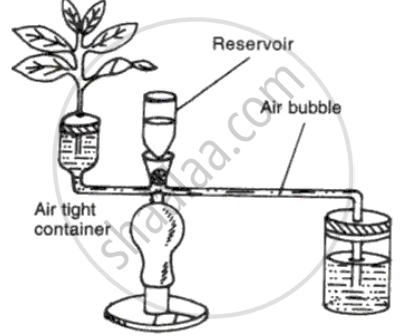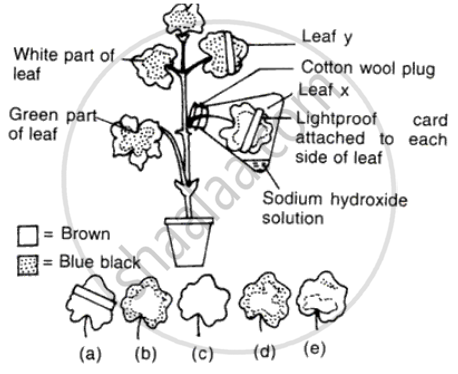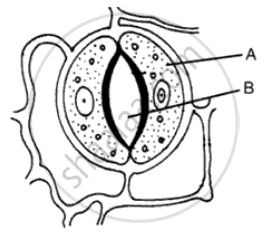Advertisements
Chapters
![Frank solutions for Biology [English] Class 10 ICSE chapter 5 - Transpiration Frank solutions for Biology [English] Class 10 ICSE chapter 5 - Transpiration - Shaalaa.com](/images/9789386811653-biology-english-class-10-icse_6:b1353f382f20442081c2a5dff2d9de4a.jpg)
Advertisements
Solutions for Chapter 5: Transpiration
Below listed, you can find solutions for Chapter 5 of CISCE Frank for Biology [English] Class 10 ICSE.
Frank solutions for Biology [English] Class 10 ICSE 5 Transpiration Exercise 1 [Page 60]
What is transpiration?
Answer the following (only in few words);
In which form, water comes out in transpiration?
Answer the following (only in few words);
Where does transpiration take place in leaves? Give names of the various parts.
Answer the following (only in few words);
Give one important difference between transpiration and evaporation.
Answer the following (only in few words);
When does stomatal transpiration take place in plants?
From which structure cuticular transpiration occur in plants?
Answer the following (only in few words);
How does transpiration take place in night?
Answer the following (only in few words);
What is the effect of temperature on transpiration?
Answer the following (only in few words);
What is the impact of more atmospheric pressure on transpiration?
Answer the following (only in few words);
What is the relationship between transpiration water and water absorbed from the soil?
Frank solutions for Biology [English] Class 10 ICSE 5 Transpiration Exercise 2 [Page 61]
Write short note on the following:
Hydathodes
Write short note on the following:
Guttation
Explain how the rate of transpiration is affected on:
a windy day
Explain how the rate of transpiration is affected on:
a foggy day
The diagram given alongside is an apparatus used to study a particular phenomenon in plants.
(i) Name the apparatus.
(ii) What is it used for?
(iii) What is the role played by the air bubble in this experiment?
(iv) Of what use is the reservoir?

Give a reason.
What happens to the movement of the air-bubble if the apparatus shown above is kept in dark.
Give a reason.
What happens to the movement of the air-bubble if the apparatus shown above is kept in sunlight.
Give a reason.
What happens to the movement of the air-bubble if the apparatus shown above is kept in front of a fan?
Comment on the following statement:
A well-watered potted plant shows wilting of leaves on a hot sunny day.
Distinguish between the following:
Transpiration and evaporation
Differentiate between guttation and bleeding in plants.
Distinguish between the following :
Cuticular transpiration and lenticular transpiration
Distinguish between the following:
Stomata and lenticels
Frank solutions for Biology [English] Class 10 ICSE 5 Transpiration Exercise 3 [Page 62]
Litmus paper is used to demonstrate transpiration from the leaves of the green plant.
True
False
True
False
Complete the following statement by choosing the correct alternative given in the bracket:
Loss of water as droplets through leaves of an intact plant is termed ______.
Bleeding
Guttation
Transpiration
The figure below represents the set-up at the start of certain experiment to demonstrate an activity of plants:
(i) What is the aim of the experiment?
(ii) Why has oil been put in each test tube?
(iii) What will be the observations in the two test-tubes after about 2-3 days?
(iv) Give reasons to explain any change observed as answered in (iii) above.
(v) Why has the test-tube b without the plant, been taken in the experiment?

Mark the most appropriate answer in the following:
If the rate of transpiration becomes more than the rate of photosynthesis, plant will ______
Continue to live, but will not be able to store food.
Be killed instantly.
Grow more vigorously because more energy will be available.
Stop growing and gradually die of starvation.
Mark the most appropriate answer in the following:
Transpiration pull will be maximum under which of the following conditions?
Open stomata, dry atmosphere and moist soil.
Open stomata, high humid atmosphere and well irrigated soil.
Open stomata, high humid atmosphere and dry soil.
Closed stomata, dry atmosphere and dry soil.
Fill in the blank with the function in the following:
Hydathodes: ______
A well watered healthy potted plant with variegated leaves was kept in darkness for about 24 hours. It was then set up as shown in the diagram and exposed to light for about 12 hours. At the end of this time, leaf x and y were tested for starch. Study the diagram and answer the questions that follow:
(i) Why was the plant initially kept in darkness for 24 hours?
(ii) What is the function of sodium hydroxide solution in the flask?
(iii) Select the correct leaf from the five available choices shown in the diagram as a, b, c, d and e. Rewrite the correct answer by filling in the appropriate letter for the questions that follow:
1. After the starch test, leaf x would look like ______.
2. After the starch test, leaf y would look like ______.
(iv) The experiment with leaf y shows that photosynthesis requires the presence of certain factors. Mention any one factor.

Frank solutions for Biology [English] Class 10 ICSE 5 Transpiration Exercise 4 [Page 63]
The apparatus shown here is Ganong's photometer designed to demonstrate unequal transpiration from the two surfaces of a dorsiventral leaf. Before keeping the leaf in between the cups, anhydrous calcium chloride (CaCl2) contained in two small vials were weighted and placed in both the cups. The ends of the cups were weighted and with corks through which two mercury manometers were connected. After a few hours, CaCl2 vials were taken out and weighed again.
(i) What is the purpose of keeping CaCl2 vials inside the cup?
(ii) After a few hours, CaCl2 vials were taken out and weighed again.
will you except any difference in weight? If so, give reasons.
(iii) What was expect the purpose of using a manometer?
(iv) What do you mean by transpiration?

The diagram alongside represents a structure found in a leaf. Study the same and answer the questions that follow:
(i) Name the parts labeled A and B.
(ii) What is the biological term for the above structure?
(iii) What is the function of the part labeled A?
(iv) Mention two structural features of A, which help in the function mentioned in (iii) above?
(v) Where is this structure likely to be found in a leaf?
(vi) The structure (fig.5.22) helps in the process of transpiration. Explain the term transpiration.
(vii) How many other cells are found surrounding this structure as seen in the diagram?

Frank solutions for Biology [English] Class 10 ICSE 5 Transpiration Exercise 5 [Page 64]
Choose the correct answer:
Which one is responsible for guttation?
Diffusion
Root pressure
Transpiration
Photosynthesis
Choose the correct answer:
Rate of transpiration is more, when __________
High humidity is present in atmosphere.
Air may be stopped.
Extra water is in sky.
Environmental conditions may dry.
Choose the correct answer:
Stomata open during day time because guard cells
Do photosynthesis and synthesis osmotically active.
Are of thin walls.
Are of bean shape.
Help in exchange of gases.
Choose the correct answer:
The cause of wilting is more ___________
respiration
photosynthesis
absorption
transpiration
Choose the correct answer:
Guttation is a mechanism of removal of water from plant by _____________
Stomata
hydathodes
lenticles
wounds
Choose the correct answer:
Secretion of sap from apex of non-injured leaf is called ___________
Evaporation
guttation
evapo-transpiration
transpiration
Choose the correct answer:
Transpiration is more ____________
From the upper surface of leaf.
From the lower surface of leaf.
From stem.
From upper and lower surface of leaf.
Choose the correct answer:
The rate of transpiration is determined with the following instrument ____________
Potometer
Evaporimeter
Atmometer
Perimeter
Choose the correct answer:
In herbaceous plants, following percentage of absorbed water comes out __________
80
60
90
40
Choose the correct answer:
Transpiration rate is high, when ___________
Atmospheric water is saturated with vapour.
Light is very dim.
Temperature is low.
Atmosphere is dry and temperature is high.
Choose the correct answer:
More water loss in plants is the cause of wilting. This can be checked by ____________
Keeping plant in bright light
Spraying alcohol on the plant
Layering the bottom with Vaseline
Giving more fertilizer to the soil
Choose the correct answer:
The percentage of cuticular transpiration in plants is _____________
Approximately 10%
Approximately 20%
Approximately 25%
Approximately 30%
Choose the correct answer:
Transpiration generates __________
Suction force
capillary force
Imbibitions force
atmospheric pressure
Choose the correct answer:
Transpiration rate is low ____________
due to less surface area of leaf
benting of leaf
By sunken stomata
all of the above
Choose the correct answer:
Stomata can open in night also in _______________
xerophyte
gametophyte
hydrophyte
none of these
Choose the correct answer:
Who had said that "transpiration is a necessary evil"?
Curtis
Steward
Anderson
J.C. Bose
Solutions for 5: Transpiration
![Frank solutions for Biology [English] Class 10 ICSE chapter 5 - Transpiration Frank solutions for Biology [English] Class 10 ICSE chapter 5 - Transpiration - Shaalaa.com](/images/9789386811653-biology-english-class-10-icse_6:b1353f382f20442081c2a5dff2d9de4a.jpg)
Frank solutions for Biology [English] Class 10 ICSE chapter 5 - Transpiration
Shaalaa.com has the CISCE Mathematics Biology [English] Class 10 ICSE CISCE solutions in a manner that help students grasp basic concepts better and faster. The detailed, step-by-step solutions will help you understand the concepts better and clarify any confusion. Frank solutions for Mathematics Biology [English] Class 10 ICSE CISCE 5 (Transpiration) include all questions with answers and detailed explanations. This will clear students' doubts about questions and improve their application skills while preparing for board exams.
Further, we at Shaalaa.com provide such solutions so students can prepare for written exams. Frank textbook solutions can be a core help for self-study and provide excellent self-help guidance for students.
Concepts covered in Biology [English] Class 10 ICSE chapter 5 Transpiration are Transpiration, Measurement of Transpiration, Types of Transpiration, Factors Affecting the Rate of Transpiration, Adaptations in Plants to Reduce Excessive Transpiration, Significance of Transpiration, Direct Loss of Water by Plants - Guttation and Bleeding.
Using Frank Biology [English] Class 10 ICSE solutions Transpiration exercise by students is an easy way to prepare for the exams, as they involve solutions arranged chapter-wise and also page-wise. The questions involved in Frank Solutions are essential questions that can be asked in the final exam. Maximum CISCE Biology [English] Class 10 ICSE students prefer Frank Textbook Solutions to score more in exams.
Get the free view of Chapter 5, Transpiration Biology [English] Class 10 ICSE additional questions for Mathematics Biology [English] Class 10 ICSE CISCE, and you can use Shaalaa.com to keep it handy for your exam preparation.
